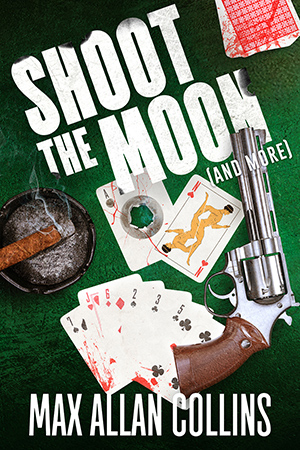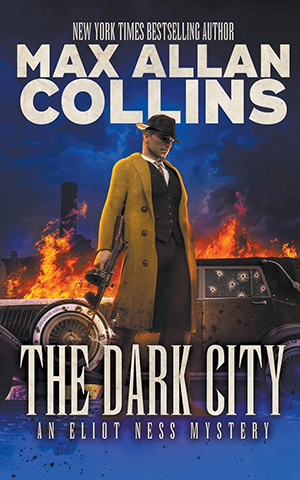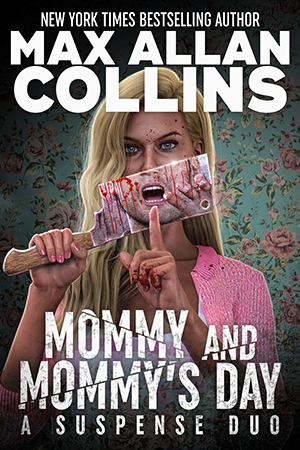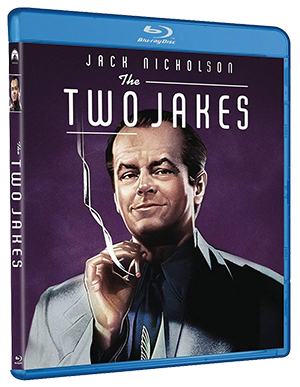Wolfpack has announced the January 6 publication of Shoot the Moon in a reorganization of the collection Early Crimes. This new version is the novel Shoot the Moon with a “bonus feature” of short stories at the back of the book. Shoot the Moon was my attempt to do a Westlake-like humorous suspense novel. It can be ordered as either an e-book or a physical book.
Also announced by Wolfpack is Reincarnal & Other Dark Tales (with a January 27 pub date). Right now it can only be ordered as an e-book, but a physical book is coming. This collects virtually all of my horror stories to date.
Blue Christmas & Other Holiday Homicides is already available from Wolfpack in both e-book and physical book form. It’s a collection of holiday-themed stories by me, including the title tale, which is my favorite among my short fiction.
Barb and I revisited two of the Christmas movies I recommended last time.
It Happened One Christmas is the re-imagining of It’s a Wonderful Life with a female protagonist (Marlo Thomas). I love this little movie almost as much as the original, but the truth is that It’s a Wonderful Life is a film masterpiece and It Happened One Christmas is a TV movie. A very good one with a remarkable cast, but a TV movie.
When it first appeared, It Happened One Christmas benefitted from It’s a Wonderful Life having dropped out of sight. But not long after the remake aired, the public domain showings of It’s a Wonderful Life began on PBS stations and revitalized interest in the original film. Despite the gender role reversal, the films are much the same, right down to the dialogue. This will be problematic for many meeting the remake for the first time.
It’s too bad, and I’m glad I saw the remake first, because it didn’t hurt my appreciation of the original at all. But the Marlo Thomas version is, in my opinion, still worthwhile with its strong cast including Wayne Rogers, Orson Welles, Christopher Guest, Cloris Leachman, Archie Hahn, Doris Martin, Richard Dysart, and Barney Martin. And for me a special resonance is the cinematography by Conrad Hall, who won an Academy Award for Road to Perdition.
Twelve Days of Christmas Eve held up very well on what must be my fourth or fifth visit. While it’s rather shamelessly a Ground Hog’s Day variant, it does so in a clever manner and star Steven Weber is excellent, as is Molly Shannon. If you ever try this, stick with it for a while, because it seems at first like just another TV movie, but becomes something very special as it goes along.
Barb and I were excited about being able to see at home the new Wonder Woman movie (apparently called WW 84 – and I haven’t even seen WW 83 yet!), springing for the new HBO Max streaming service to do so. And guess what? WW 84 is one of the worst superhero movies I’ve ever seen. What did Barb think? She walked out – and we live here!
Where to start? The opening on Amazon Island (or whatever it’s called) is fine. But once we get to 1984, one problem after another presents itself. Let’s get this out of the way: nothing wrong with Gal Gadot, whose super-power seems to be emerging from this crock unscathed. If you are a man, this is not a movie you want to be in, unless you are Chris Pine or a homeless black guy, as every other adult male is a lout at best and a potential rapist at worst.
Chris Pine doesn’t fare that well himself, actually. He comes back from the Great War dead to be wide-eyed and astonished by such marvels as escalators (introduced around 1900) and a subway (introduced around 1890). He tries on a lot of groovy ‘80s clothes, which (as any 1910s guy would do) he finds really cool, particularly the man purse. By the way, in this movie where men are reprehensible, Diana Prince (SPOILER ALERT: Wonder Woman) allows an unknowing male to become the receptacle for her dead boy friend’s persona and almost immediately has sex with him.
What can you say about a film whose super-villain is a blithering jackass? Really, just another weak man who happens to be an a-hole? Or about a script whose theme is wishes coming true but at a cost…a cost that never defines its boundaries (i.e., some people immediately lose whatever they gave up to get their wish, but – so that she can participate in fight scenes – Wonder Woman only very gradually loses her powers).
Then there’s Kristen Wiig, who plays her role as a supposed nebbish girl like an SNL character, then unbelievably becomes a mostly CGI bad girl (the Cheetah, a recurring Wonder Woman villain, but never named in the film). What Kristen gave up for her wish was her…niceness.
This is a super-hero movie that made me want to reconsider Green Lantern. How could the first Wonder Woman film be so good, and this one so wretched? Same director. Different result.
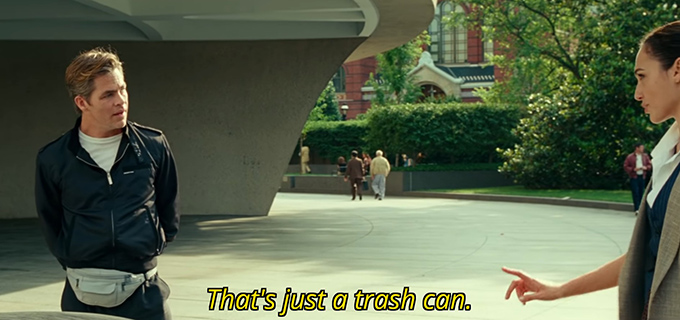
While I haven’t dug into it yet, the Taschen coffee table tome, The History of EC Comics, was my “big gift” from Barb this year. I love these books but they are difficult to deal with. A hernia is no way to start the New Year. But what a thing of beauty this baby is.
My son Nate gave me two books in Marc Cushman’s These Are the Voyages series of big, long, in-depth tomes about Star Trek. I have mentioned here that Barb and I were trek fans before the dreaded term trekkie was even coined. We attended one of the first Star Trek conventions, and watched the episodes in syndication over and over. I bought the comic books and James Blish paperbacks. We went to dinner theater plays in Chicago starring (separately) William Shatner and Leonard Nimoy. I got to know Walter Koenig, at first by mail (we traded Big Little Books) and then in person. (Later I would cast Majel Barrett Roddenberry in Mommy.) We went to Gene Roddenberry’s embarrassing film Pretty Maids All in a Row in the theater, and we stood in the cold for hours to see Star Trek: The Motion Picture (which remains one of my favorite films, for which I have no apology).
These books chronicle everything. The first three are about each original season, but now I’m reading book four, which is about the years leading up to the animated series. Cushman’s tomes are well-written and ridiculously thorough – how ridiculously thorough? How about reviews quoted at length from those dinner theater appearances I mentioned earlier? Or tons of the bad reviews Pretty Girls All in a Row got? Or what TV shows the secondary cast members appeared in between the series and the movies?
So you have to be something of a lunatic where Star Trek is concerned – the real Star Trek, that is – to want anything to do with these three-inch-thick books. And I qualify.
Thank you, son.
As a sidebar to the WW 84 review above, let me say that after recently adding movie channels to our cable and streaming channels to our Roku, I am underwhelmed and overwhelmed at the same time. “Over” because there is so much of it. “Under” because so little of it appeals to me.
Much of the new product seems so politically correct and painfully diverse to make me consider voting Republican (we all have our weak moments). “Free” content on most of the streaming services is commercial-ridden. But now and then I stumble onto something good.
In 2015, Colin Hanks (whose father, I understand, appeared in a very good gangster film) directed a documentary about Tower Records called All Things Must Pass. It’s an extremely well-made film in which Russ Solomon, the creator of the record-store chain, is interviewed at length; so are many of the original employees, who rose to high levels within the company, and such music luminaries as Elton John and Bruce Springsteen.
I loved Tower Records. Any time I was in a big city, I tracked Tower Records down. Each store was the same but different, reflecting the individual management and its employees. Those red letters on yellow thrill me to this day. I bought CD’s there. And books. And magazines. And laser discs. And DVDs.
In Chicago. In Los Angeles on Sunset. In New York in the Village. In Honolulu. In London. In Las Vegas. These stores were a pop culture paradise, and they still exist only in Japan, and in my memory.
I hate streaming. I hate e-books (except for the income they generate for me, of course). I am Old School. Physical Media. Physical Media. Physical Media.
Nice job, Mr. Hanks. Cool work on Fargo, too.
Among the oddball, quirky Blu-ray labels I support is Vinegar Syndrome. You should check them out. On their Black Friday sale, I bought Forgotten Gialli Volume 2 and a box set of The Beastmaster. The packaging is incredible and the bonus content mindboggling. They do intersperse “classic” porn titles between the horror and giallo and s-f titles, so take care. Some of their media gets pretty physical.
I will see you next year. By then, I will be working on Quarry’s Blood. Skim Deep was a coda to the Nolan series, and this one will be a coda to the Quarry series.
Shall we endeavor for 2021 not to suck quite so thoroughly as 2020? On the other hand, the thing I’m looking forward to about next year is getting a vaccine shot or two.
Here’s a nice recommendation for Skim Deep.
M.A.C.
